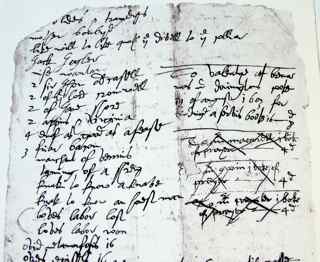Love's Labour's Won
Historical Records
1598, Palladis Tamia: Internet Archive
In 1598 Francis Meres, a cleric and schoolmaster, published a lengthy essay entitled Pallidas Tamia, Wits Treasury in which he praised contemporary English poets by comparing them favorably to their classical counterparts. He wrote the following paragraph about Shakespeare:
As Plautus and Seneca are accounted the best for comedy and Tragedy among the Latines: so Shakespeare among ye English is the most excellent in both kinds for the stage; for Comedy, witnes his Ge[n]tleme[n] of Verona, his Errors, his Loue labors lost, his Loue labours wonne, his Midsummers night dreame, & his Merchant of Venice: for Tragedy his Richard the 2. Richard the 3. Henry the 4. King Iohn, Titus Andronicus and his Romeo and Iuliet.
1603, Packing slip, Christopher Hunt:
A bookseller named Christopher Hunt moved to Exeter in 1603 when he finished his apprenticeship in London. He had books shipped to him at his new location. A leaf of manuscript—apparently a packing slip—dated 19 August 1603 on the verso (9 August on the recto) was discovered in 1953 by a London bookseller and antiquarian named Pottesman as part of the binding of a collection of sermons printed in 1637 (Certaine Sermons). Pottesman showed the leaf of manuscript to American scholar T. W. Baldwin as he was leaving the British Museum (now Library) on the evening of 31 December 1953. Baldwin subsequently researched the provenance of the manuscript and determined that it represented property of Christopher Hunt. Baldwin published his findings in Shakspere's Love's Labor's Won in 1957.
Theatrical Provenance
A reasonable assumption, based on Shakespeare's authorship, is that Love's Labour's Won belonged to the Chamberlain's Men. The date of acquisition, sometime between 1594 and 1598, is predicated on the assumption that Shakespeare wrote the play as a sequel to Love's Labour's Lost.
Probable Genre(s)
Comedy (Harbage)
Possible Narrative and Dramatic Sources or Analogues
A reasonable assumption is that Shakespeare's Love's Labour's Lost is a narrative and dramatic source for Love's Labour's Won. The most logical guess at a story is the courtships suspended at the close of Love's Labour's Lost, but there are play titles that advertise themselves as mates yet do not carry over either characters or story lines from their apparent companion play: for example, A Knack to Know an Honest Man (matched by title with A Knack to Know a Knave) and Every Man out of his Humour (matched by title with Every Man in his Humour).
References to the Play
Francis Meres, Palladis Tamia, Wits Treasury (Oo3) Internet Archive
Critical Commentary
Fleay initially accepted Love's Labour's Won as a lost play by Shakespeare (Chronicle History of the Life and Work of William Shakespeare, 104), but he soon began to consider the play "the nucleus" of All's Well That Ends Well (Shakespeare Manual, 24). Support may also be found for the title as a mask for The Taming of the Shrew, which scholars believed to have been written and staged well before 1598 but which Meres does not include in his list of exemplary Shakespearean comedies. Chambers, showing the inclination of scholars to perceive Love's Labour's Won as an alternative title for a surviving play, settles on The Taming of the Shrew without much enthusiasm; he considers it "the only comedy which, as it stands, could fill a gap in Meres's list" (1.273).
Baldwin revolutionized scholarly thinking about the play in Shakspere's Love's Labour's Won by publicizing the manuscript leaf found by Mr. Pottesman and researching the provenance of that leaf.
Knutson projects a stage history for the play. She suggests a debut in the spring of 1595 (50), with the play offered in tandem with its first part, Love's Labour's Lost (51). Noting that the play was apparently not revived when its companion was given at court on 6 January 1605, she deduces that the play was already lost by that time (52) and thus unable to be found by Heminges and Condell for inclusion in the First Folio (53).
For What It's Worth
Works Cited
Baldwin, T. W. Shakspere's Love's Labor's Won. Carbondale, IL: Southern Illinois University Press, 1957.
Chambers, E. K. William Shakespeare: A Study of Facts and Problems. 2 vols. Oxford: Clarendon Press, 1930.
Fleay, F. G. A Chronicle History of the Life and Work of William Shakespeare: Player, Poet and Playmaker. London, 1886.
———. Shakespeare Manual. 1876; rpt. New York: AMS Press, 1970.
Knutson, Roslyn L. "Love's Labor Won in Repertory." Publications of the Arkansas Philological Association, 11.1 (1985): 45-57.
Meres, Francis. Palladis Tamia, Wits Treasury. 1598. Internet Archive
Site created and maintained by Roslyn L. Knutson, Professor Emerita, University of Arkansas at Little Rock; updated 31 January 2010.
